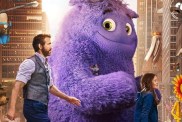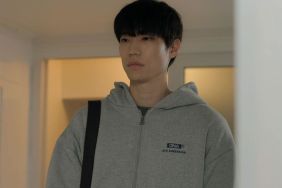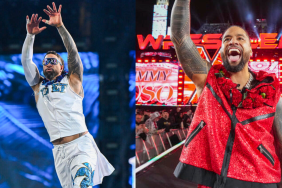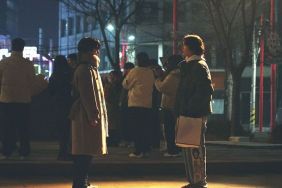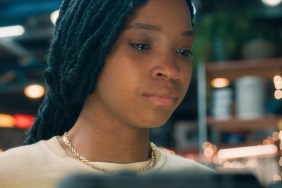After his second feature The Illusionist garnered acclaim, director Neil Burger decided to take a different approach when he made the follow-up The Lucky Ones. Unlike the period film, which was mostly shot on soundstages in Prague, Burger decided to make an American road movie that follows three soldiers on leave from Iraq who share a ride across the country after their flights are cancelled.
With that in mind, he took the show on the road while finding three actors who were game to pile into a van and travel across country with him and his crew. Tim Robbins took the role of Fred Cheever, a middle-aged reservist whose been away from his wife and son for two years, Rachel McAdams plays the optimistic Colee Dunn, a Southern Christian, and Michael Peña is the tough T.K. Poole, who received an injury in a delicate part of his body. Over the trip, the three soldiers get to know each other while meeting Americans who all act differently to them, but The Lucky Ones isn’t the dark, politically-motivated drama we’ve seen so much of in recent years, instead being lighter and more entertaining, as the three soldiers from different backgrounds bond while they see America, encounter different people and come to terms with their own personal ideas of where they’ve been and where they’re going.
Last week, ComingSoon.net sat down with Burger to talk about making his very different third film.
ComingSoon.net: So let’s talk about how this idea started
were you trying to do something specifically about Iraq or the soldiers?
Neil Burger: I think I wanted to do a movie about America now, and do a snapshot of the country now. Whatever is going on with the war I think is a very small part of what this country is about, and the changing American character and the changing American landscape. So I just wanted to take a look at all that and I thought the road movie was the perfect genre to use to take a good look at that. It’s actually really a fun way to look at more interesting issues as well.
CS: Did you get any chance to talk with actual soldiers or watch any of the docs about those who’ve returned from Iraq?
Burger: We talked to people that were over there, we talked to people that had come back and were going back, and also did kind of secondary research of reading, and watching movies, and things like that. And as I said also taking that road trip myself and also weaving it all together. We wanted to make sure we had this soldier stuff down, but I think first and foremost these guys are just people and they’re Americans, and the fact that they’re soldiers puts sort of a fine point on it, but it’s not who they are as human beings, or not first and foremost.
CS: There have been a number of movies recently about soldiers home from Iraq, so you expect this to go a certain way, but this is lighter and more entertaining, so was it hard to find a balance of humor and drama?
Burger: Well that was the challenge of it and that was always my goal, was to use the humor and use the sort of outrageous situations to kind of get at some larger truth. I think laughter and humor enable certain truths to land with more impact and I think that laughter can have a real ability heal the human spirit. I thought it was the way to go, rather than to go at it in kind of a strident or a dogmatic way, I thought, “Well let’s make this fun ride and get into the hearts of these characters and let them into your heart,” and then the other stuff will come and be meaningful and I think we were successful.
CS: There’ve been a lot of good docs about the experience, such as “The Ground Truth” and “The War Tapes,” so were you able to see some of them?
Burger: I wouldn’t say I’ve seen them all, but I’ve seen quite a few of them. “The War Tapes,” “Gunner Palace.”
CS: Did any of those affect the writing or was there anything that you saw in them you wanted to include?
Burger: Not really. They informed it absolutely and informed the sort of behavior. There’s actually a lot on YouTube too, just like little episodes and things happening which were pretty intense.
CS: You mean that soldiers shot and uploaded?
Burger: Yeah, amazing and some disturbing stuff. They are soldiers absolutely, but they are first and foremost human beings and Americans. So we wanted to get the soldier stuff right and have that believable, but we also didn’t want that to overshadow just their average humanity.

CS: When you were writing it, did you realize there were going to be a lot of challenges as far as shooting it while driving on the highway and did you try to work that stuff out while writing the script?
Burger: Yes, as a director I know how to do that, but you still get kind of caught up in the excitement of the original idea and you forget what a nightmare it is to actually put the damn thing together. But yeah, you do that, and I decided I wanted to do it. I really wanted take that trip with the cast and crew and shoot it on those real roads and shoot it on highways and shooting it at speed driving in that mini-van sixty miles an hour and going to the McDonald’s. If you’re trying to get from New York to St. Louis as fast as you can, you’re on the interstates, you’re not taking scenic byways. You’re going and it’s like, well that’s America too and it’s probably truer America and how do you look at that in an interesting way?
CS: I understand you actually built a custom van with a driver on top of the roof driving it, which is the most amazing thing I’ve ever heard.
Burger: That was the trick, so you’re going sixty-five miles an hour and somebody gets in a fight, they’re actually throwing things in the car. How do you do that? You can do that in the old way of putting the car on a trailer and just rolling it, but somehow it never looks quite right or it can look right but it just seems like you get hemmed in how you shoot. It always has to be through the windshield or whatever. I wanted the whole movie to have a kind of caught on the run sort of feel and so the trick was like, how are you able to do that? How do you swing the camera everywhere and see them? So we built this mini-van that had a precision driver on the roof kind of in this little roll cage, but he’s actually driving the car from up there which means that he can pass people and weave around and do all sorts of things and do it safely and do it at speed.
CS: How game were Tim and Michael, and especially Rachel, to do a movie like this on the road?
Burger: I think they were game, they did it. I think they understood what the movie was about and the quality of trying to be true to the characters, and true to the trip and also the funny stuff mixed with the more serious stuff. It’s funny because they started as three strangers just like the characters in the movie. And we put them in the mini-van and then over the course of the movie they really became good friends. Again like the characters who form this little bond, this unit that’s kind of stronger than anything else in their lives. These guys, for the portion, they would shoot all day and they’re in almost every frame together in the movie. So they spent all day stuck in that mini-van together and then they’d all three of them they’d go out to dinner together afterwards, or they’d go see some music. They traveled as this three headed beast. So it was great. As a director you can kind of push them in that direction and hope that that’s happens, but you can’t force it, you can’t guarantee it. So we were very fortunate that they had great chemistry, and they’re really funny, and have great characters.
CS: All three actors have done bigger movies, so was it hard to get them on the road without their managers, publicist, stylists, etc?
Burger: An entourage. I don’t think any of them, including Tim whose got an Academy Award and all that stuff, they don’t travel that way and they’re not too fussy. They just kind of get down and do the work. They’re not late to the set, they don’t go and hide in their trailers, they just sort of hang out and all three of them kind of make the whole experience fun. I think they had a good time doing it.
CS: I always figured that the actors don’t care about not having those people around, but those people always want to be there.
Burger: You’re right, but there was none of that stuff. None of those people were around.
CS: Did you avoid any kind of rehearsal process to try to create their bonding naturally?
Burger: No I think we did rehearse but it wasn’t like full scenes or sequences. It was more like we just talked about the roles just to make sure that they were all on the same page with how it was being played. And then they tried to spend as much time together as possible just so they did get a comfort level with each other. It’s easier for them to fight each other than it is to actually bond. So I wanted to make sure that there was some bond to hang onto between the three of them.
CS: How big a crew did you have besides you and the driver?
Burger: It’s always bigger than you hope it is. We probably had like a crew of about sixty people or something like that. When you try to cut it down you’re like, “Well why do we have five grips?” And it’s just like, “Well, if you want to have that car done in time. If you want to have that equipment put on that car and be ready to go between set ups, you have to have enough guys to do it.”
CS: How’d you hide sixty people?
Burger: I know. Well, they stayed behind, they kind of traveled with us, but invariably you’re dragging all these people with you, so it’s expensive and makes it hard.

CS: I’m sure you’re asked this often, but were you able to shoot in some kind of chronological order to take advantage of the actors bonding?
Burger: To a degree. To a degree we did. We certainly moved East to West, but every once in a while we’d pick up certain things. And there’s a number of scenes in airports and we all did them at one airport in different parts of the airport, and that’s at the beginning, middle, and end. But our overall journey was definitely East to West which mimicked what was going on in the movie.
CS: Did you do a trip of your own to find the locations to shoot?
Burger: I did. I took that road trip and found those places, and then wove those anecdotes and that sense of locations and those things all into the movie.
CS: Did your co-writer Dirk Wittenborn come along on that trip with you or did he stay behind and help put everything together?
Burger: Yeah, I think Dirk was really part of the writing process but he was just invaluable. I couldn’t have done it without him.
CS: As far as different characters, did you have something you wanted each one of them to represent?
Burger: I did. I think that Rachael McAdams’ character Colee is kind of naïve but wise at the same time, and she’s sort of very open and optimistic yet a fighter with a foul mouth. She can really throw a punch, and then T.K. is very proud and kind of a know-it-all; he’s sort of the cocky American. And Cheever played by Tim Robbins is kind of the middle-aged, middle class American getting the shaft. He’s sort of the forgotten American.
CS: He’s been in the military for a while?
Burger: A reservist actually. He did a military stint when he was a young man and now he got called back up and has to leave his family which plenty of people did. He does it probably a little bit grudgingly and then he comes back and things have changed for him.
CS: I thought it was interesting how people react to the soldiers on the road, because I’ve seen the same thing where you don’t know what to say to them. “Sorry for reelecting Bush again”?
Burger: You say, “Welcome home.”
CS: Yeah, good one. It’s definitely refreshing that you decided to shoot it using more of a realistic style, even though most people will not expect it after the lavish cinematography and production design of “The Illusionist.” As a director who has created that visual style, is it hard to shoot movies in this sort of stripped back way?
Burger: It wasn’t really hard. Actually I wrote the script in the same way I wrote “The Illusionist.” Even though it’s a road movie and feels very loosely done, it’s all very specifically constructed with little twist and turns and things laid in and the pay-off to create story that evolves and becomes stronger. It’s the same way with the shooting style. It’s a totally different kind of movie so that even though I’m not shooting in the same way, I’m thinking about servicing the story in the same way, but it’s a different story so it needs to be shot in a different way. I’m very specific about the way it looks even as it has this loose kind of caught on the run feel, but I like the way it looks, and we still worked on the color and the choices. It wasn’t as delicate as “The Illusionist” and it has a different kind of beauty obviously than “The Illusionist,” but it has its sort of unity of style.
CS: Since you’re working on location a lot more, you’re also dealing with the weather and other uncontrollable stuff.
Burger: That’s right. Moving in a car and stuff like that and constantly shifting and lights glinting off of cars.
CS: Did you end up having to shoot a lot of stuff on the fly?
Burger: Sort of. I mean we wanted it to look like it was on the fly, but it’s pretty hard to shoot totally on the fly when you’re driving and keep it safe and also get what you need to get to lay in the story that you’re after.
CS: So it wasn’t one of those things where, “Okay, let’s wait for the cloud to be just in the right position
”
Burger: We couldn’t afford to do that. I would’ve liked to have done that, but we couldn’t afford to do that.
CS: Did you end up enhancing stuff later with CG?
Burger: Not really. Sometimes you do stuff just to clean it up.
CS: I assume the twister has got to be CG though.
Burger: The twister is. We shot on that road and then enhanced it. We also shot one thing on stage just to kind of help out some of the rain and stuff like that. But yeah, we digitally-enhanced some things.

CS: Did you have to shoot anything guerilla-style or did you go through the normal process of securing locations, scheduling, etc?
Burger: I feel like we did grab something. No, I think we really controlled it. Every once in a while there was something that we’d shoot kind of like, “Get that,” while we had the moment to get it, or we’d be just shooting in the car and we’d be resetting and I’d be like, “Just roll on the actors doing something” but for the most part it was all kind of built.
CS: The first time I talked to Tim was for Michael Winterbottom’s “Code 46” and he had a lot of horror stories about shooting things guerilla-style in the middle of wherever, so I was curious why he jumped back into this.
Burger: Yeah, different than the way we did it. Even as we wanted to have that kind of shot on the run kind of feel to it.
CS: Was it hard getting studios to understand the movie’s appeal to moviegoers? I know that these days, press tends to think that Americans don’t want to see movies that deal with Iraq or soldiers.
Burger: I think Americans will enjoy this if we can get them into theaters. We’ve seen it with audiences and they really like it. In a way it’s up to you guys because if you guys put it in terms of like, “Oh God, it’s just another one of these movies” then everybody else is going to be like, “I don’t want to see that either.” The trick is to somehow make people understand that it is funny and it’s meaningful also. It’s kind of a wild ride.
CS: Do you have any idea what you’re going to do next?
Burger: I am. I mean I do know. I am in preproduction on a movie called “The Dark Fields” with Shia LaBeouf. We’re going to shoot that this winter. I didn’t write it. It’s the first thing I’m going to direct that I didn’t write and it’s kind of liberating to just direct it. It was sent to me and I really liked it, and we’ve done a little work on it.
CS: What’s that about?
Burger: It’s about a pill that makes you smarter and it takes place in New York City, but not in any sort of sci-fi way. It’s more like if there’s Viagra or Steroids or something like that why isn’t there something that increases your synaptic connections and makes you think smarter and faster? But it’s not without side effects and consequences.
CS: I really don’t get impression that people out there really want to be smarter, do you?
Burger: (laughs) They seem to want to be dumber at the moment.
CS: Regardless, that sounds really cool, and I’m glad to hear you’re shooting in New York.
Burger: Yeah, me too, God. I live in New York so it’ll definitely be great to shoot at home.
CS: You did “The Illusionist” in Eastern Europe, right?
Burger: In the Czech Republic. I was away for five or six months. Even this movie, “The Lucky Ones” I was away for three and a half months shooting across the country, so it’s good to be home.
CS: So “The Dark Fields” is more of a studio movie?
Burger: It’s with Universal. Even though it’s pretty edgy and different for a studio movie it’s a good one.
CS: I find that Universal is pretty good with unconventional material like they have a movie about a guy who invented the windshield wiper.
Burger: That’s right. That’s pretty good. They’re cool people actually.
The Lucky Ones opens in select cities on Friday, September 26. Check out an exclusive clip from the film here.


